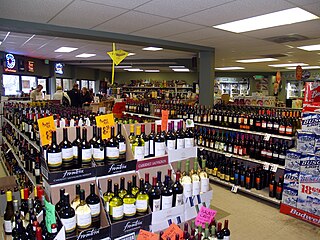
A liquor store is a retail shop that predominantly sells prepackaged alcoholic beverages — typically in bottles — intended to be consumed off the store's premises. Depending on region and local idiom, they may also be called an off-licence, bottle store, bottle shop, package store, party store, ABC store, state store, or other similar terms. Many jurisdictions have an alcohol monopoly.
Alcoholic beverage control states, generally called control states, are 17 states in the United States that, as of 2016, have state monopoly over the wholesaling or retailing of some or all categories of alcoholic beverages, such as beer, wine, and distilled spirits.

The Texas Alcoholic Beverage Commission, or TABC, is a Texas public agency responsible for regulating, inspecting, and taxing the production, sale, and use of alcoholic beverages within the state. The agency was established in 1935 and is headquartered in Austin.

The California Department of Alcoholic Beverage Control (ABC) is an agency of the government of the state of California charged with regulation of alcoholic beverages.
The New Jersey Division of Alcoholic Beverage Control is an agency of the government of the state of New Jersey that regulates commerce in alcoholic beverages in that state.

The Utah Department of Alcoholic Beverage Control (UDABC) is a state government agency of the U.S. state of Utah. It has its headquarters in Salt Lake City.
The Kentucky Office of Alcoholic Beverage Control is an agency of the government of the U.S. state of Kentucky, within the state's Department of Public Protection and Environmental and Public Protection Cabinet.
The North Carolina Alcoholic Beverage Control Commission is an agency of the government of North Carolina within the state's Department of Commerce.
A liquor license is a governmentally issued permit to sell, manufacture, store, or otherwise use alcoholic beverages.

The Delaware Division of Alcohol and Tobacco Enforcement (DATE) is a law enforcement agency of the State of Delaware and is a division of the Delaware Department of Safety and Homeland Security (DSHS).
The Alcoholic Beverage Control Division is an Arkansas state government agency. The duties of the Alcoholic Beverage Control - Administration Division are to receive applications for and issue, refuse to issue, suspend or revoke permits to manufacture, wholesale, retail and transport alcoholic beverages in Arkansas.

The Division of Alcoholic Beverages and Tobacco (ABT) is the Florida state government agency which licenses and regulates the sale of alcoholic beverages and tobacco. It is part of the Florida Department of Business and Professional Regulation (DBPR).
The Alcoholic Beverages Control Commission is a Massachusetts state government agency responsible for licensing or permitting participants in the alcoholic beverages industry in Massachusetts. It licenses manufacturers of alcoholic beverages, wholesalers and importers and out-of-state suppliers of alcoholic beverages. Additionally, brokers, salesman, warehouses, planes, trains, ships, ship chandlers and motor vehicles transporting alcoholic beverages in Massachusetts require licensing. The Commission also approves the granting of every retail pouring or package store license application allowed by a city or town.
The Division of Alcoholic Beverage Control is a division of the New York State Executive Department which exercises alcoholic beverage control functions through the State Liquor Authority.

The serving of alcohol in the Commonwealth of Massachusetts is governed by the Alcoholic Beverages Control Commission (ABCC), which is responsible for issuing licenses and permits for all manufacturers, wholesalers and importers, out-of-state suppliers, brokers, salespeople, warehouses, planes, trains, ships, ship chandlers and vehicles transporting alcoholic beverages.

The New York State Executive Department is the department of the New York state government that serves as the administrative department of the Governor of New York. This department has no central operating structure; it consists of a number of divisions, offices, boards, commissions, councils, and other independent agencies that provide policy advice and assistance to the governor and conduct activities according to statute or executive order. Its regulations are compiled in title 9 of the New York Codes, Rules and Regulations.

A ban on caffeinated alcoholic drinks is a ban which prevents the marketing and distribution of any prepackaged caffeinated alcoholic drink.
The New Jersey Farm Winery Act was legislation passed by the New Jersey state legislature and signed by Governor Brendan Byrne in 1981. The Farm Winery Act was the first of several efforts by the New Jersey state legislature to relax Prohibition-era restrictions and craft new laws to facilitate the growth of the alcoholic beverage industry and provide new opportunities for winery licenses. Before it was enacted, New Jersey provided only one winery license for each million residents and licenses were practically impossible to obtain. By 1981, New Jersey boasted only seven wineries. By 1988, that number had doubled to 15. As of 2014, New Jersey currently has 48 licensed and operating wineries with several more prospective wineries in various stages of development. New Jersey wineries produce wine from more than 90 varieties of grapes, and from over 25 other fruits.








